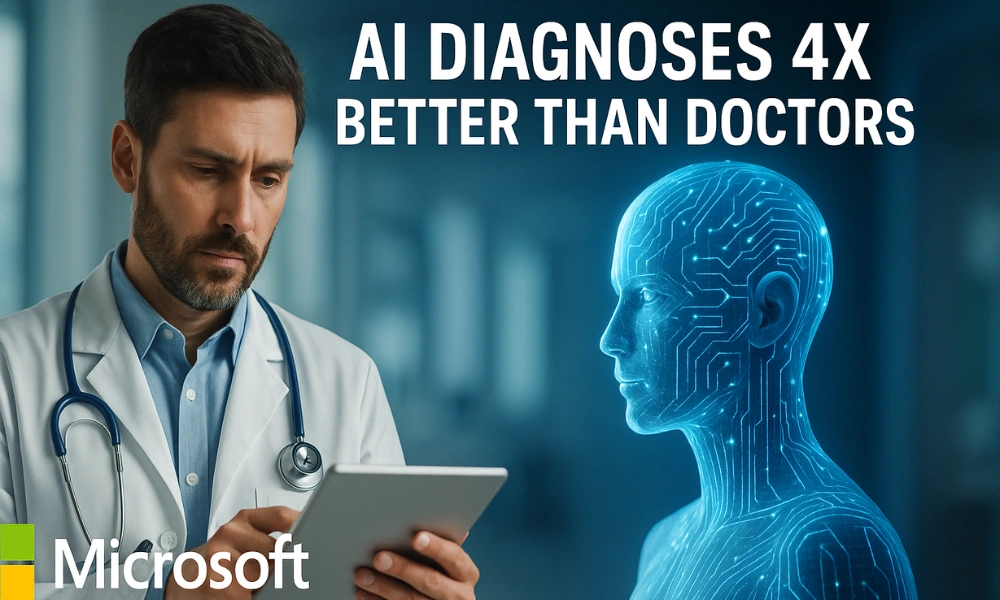Microsoft just dropped a bombshell in the world of AI and healthcare. Its new diagnostic system reportedly identifies diseases four times more accurately—and at lower cost—than a team of human doctors. This could be a turning point in the race toward AI-driven medical superintelligence.
Key Takeaways:
- Microsoft’s new AI system achieved 80% diagnostic accuracy, vs. 20% for human doctors.
- It reduced healthcare costs by 20% through smarter test selections.
- Built using a collaboration of top-tier AI models (GPT, Gemini, Claude, Grok).
- It mimics how doctors reason through diagnoses—not just pattern-match.
- The company calls this a step toward “medical superintelligence.”
Microsoft Claims AI Can Outdiagnose Human Doctors
In a bold leap toward redefining healthcare, Microsoft has introduced a cutting-edge AI system that it says can diagnose diseases four times more accurately than panels of human doctors. The system, called MAI Diagnostic Orchestrator (MAI-DxO), also cuts costs by 20%—a double breakthrough that’s grabbing global attention.
Mustafa Suleyman, CEO of Microsoft AI and a former Google executive, called the innovation “a genuine step towards medical superintelligence.” That’s no small claim in a world racing to combine human intelligence with machine precision.
Inside Microsoft’s Groundbreaking Test
To test the system, Microsoft researchers used 304 complex case studies from the prestigious New England Journal of Medicine. These weren’t simple checkups—they were difficult, real-world diagnostic puzzles that often stump even experienced physicians.
The team devised a benchmark they’re calling SDBench (Sequential Diagnosis Benchmark), designed to reflect how doctors think through cases —symptom by symptom, test by test, step by step.
But MAI-DxO didn’t operate in isolation. Instead, it orchestrated input from a panel of today’s leading AI models—including OpenAI’s GPT, Google’s Gemini, Anthropic’s Claude, Meta’s LLaMA, and xAI’s Grok—in a “chain-of-debate” style, mirroring how a group of medical experts would hash out a difficult case.
The Results? Staggering
The AI ensemble achieved an 80% accuracy rate in diagnostics—compared to just 20% for human physicians under the same constraints. That’s not a small gap; it’s a chasm.
Even more compelling: the system made more cost-effective decisions, avoiding unnecessary tests and procedures. In an industry known for ballooning expenses, this alone could have massive implications.
Dominic King, Microsoft VP and healthcare expert, emphasized that it’s not just about precision—it’s about affordability. “Our model performs incredibly well, both in reaching the diagnosis and doing so cost-effectively,” he said.
A Tech Arms Race in Healthcare
To make this happen, Microsoft hired several high-profile AI researchers from Google—a move that signals the increasingly competitive battle for talent in the AI space. The line between tech giants and healthcare pioneers is blurring fast.
AI is already used in parts of healthcare—radiology, for example—but general diagnostic tools that function like physicians are still in early stages. Microsoft’s model may be the closest yet to breaking through that wall.
Still, experts caution against overhyping. David Sontag, an MIT professor and co-founder of the medical AI startup Layer Health, noted the doctors in the study were asked not to use external tools—a limitation that doesn’t mirror real-world practice. That makes the 4x claim impressive, but not the final word.
Is This the Future of Diagnosis?
Eric Topol of the Scripps Research Institute agrees it’s an “impressive report” and applauds Microsoft for tackling difficult cases. But both he and Sontag agree the real test lies ahead: a full clinical trial comparing AI-assisted care versus traditional physician diagnoses.
The biggest difference with Microsoft’s approach, experts say, is that it closely mimics the actual diagnostic process—rather than simply spitting out predictions. That nuance could make it more trustworthy and scalable.
For now, Microsoft has not confirmed whether it will commercialize the tool, but insiders say future integrations with platforms like Bing Health or clinical software are being discussed. “You’ll see more work proving these systems out in the real world,” Suleyman added.
A Glimpse Into Medical Superintelligence
Whether MAI-DxO becomes a household tool or a back-end system for clinicians, the message is clear: AI in medicine is no longer a futuristic concept—it’s knocking at the door.
And Microsoft wants to be the one opening it.
